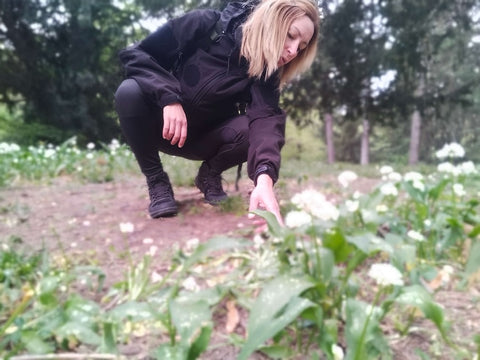by Kyt Lyn Walken
Mental, physical and practical preparedness are the hiker's top priorities.
Being skilled at sizing up situations and risks should come immediately after.
An emergency situation could arise at any time. Each one of them could require calm risk analysis, resources, a strong mindset and pragmatic approach to solve critical issues.
In this article we will focus on six essential skills you need to master if you love hiking.
Being an Outdoor enthusiast for all your life doesn't make you an expert. In fact, there is a substantial difference in spending some weekends out for camping, hiking, climbing, hunting or whatever and mastering real skills which could literally save your life.
One thing is sure: the Outdoors represent a valuable resource of different materials like wood, water, plants, meat and so on. The first critical issue consists of taking advantage of them without exploiting what surrounds you. This is especially true in a long-term survival situation.
The second one is related to the true level of your skills. Starting from the famous, wise words "Use it or lose it", you cannot rekindle some abilities you gained during your Boy Scouts years and pretend you are still good at some – or even all – of them.
Without a constant, methodical practice it is easy to forget some of them. Furthermore, tension, anguish, panic, fear can become overwhelming.
Don’t Let Blisters Slow You Down!
Discover the ultimate solution with ArmaSkin Anti-Blister Socks. Designed with advanced friction-reducing technology, these socks keep your feet dry, comfortable, and blister-free – no matter the challenge.
Shop NowTo set the scene regarding being outdoors:
The pros are all consistent with the inner natural dimension of being off grid:
- abundance of timber to make fire, to build a shelter, and so on
- presence of game
- presence of water
- possibility to move and to live undetected
- decrease of risks to handle with potential ill-intentioned people and, in general, with high-risk situations
The cons are mainly connected with:
- scarcity or total absence of modern devices you may need (GPS, mobile phones..)
- potential impossibility to find instant help
- inconvenience of being off grid due to the presence of predators and insects
- suffering from the elements and so on
Physical and mental preparation could be achieved by spending as much time as we can off in the backwoods, experiencing different weather conditions, pushing ourselves to the limit, testing our attitude and skills.
6 skills you need if you love hiking
1. Navigation
Surviving an emergency situation inside an area you are familiar with is obviously the most reasonable option.
Having already scouted a specific place can actually help you in:
- detecting the right place where setting your temporary shelter (using a tarp, for example)
- identifying the existing resources
- starting to build a natural shelter (resorting only to natural materials)
But what if you are in an area you have never seen before?
In this case, a good, detailed map of the area is mandatory.
Along with that, you will be required to be good at using a compass and being accustomed to set reference points while you move on.
Natural navigation and orientation are the first skills you need to gain and master.
2. Building a shelter with natural materials Once Once you've identified an ideal place to spend the night/s, setting up a temporary or long term shelter is a necessity.
Once Once you've identified an ideal place to spend the night/s, setting up a temporary or long term shelter is a necessity.
Making a shelter requires practical skills, like handling a blade in the correct way (knife, axe, saw and so on) and the ability to make knots in order to make it solid, resistant and responding to all the requirements connected with:
– safety
– heating
– comfort
3. Heating

Setting up a shelter also requires heating, especially when bad weather strikes.
Starting a fire involves gathering the proper tinder as well as the right wood to burn and to use as a deflector.
There are several methods to start a fire, from using a ferro rod by friction: each one has its own issues, related to resources, percentage of humidity, your physical and mental performance.
Knowing all of them is certainly good, but never underestimate the power of common sense: when you feel fatigue your performances cannot hit the top. A low level of calories, for example, will undermine any success.
4. Nutrition
Gathering edible plants and berries isn't as easy as it may appear. Just think about to Christopher McCandless story. Running into mistakes is very, very likely.
Therefore it is pretty reasonable not only to always have with you a manual of local edible plants containing good photos (not sketches!) of the flora of a specific area, but also to do a toxicity test before eating any of them. (an earlier blog gives tips for finding edible food when outdoors)
Collecting and purifying water is another critical matter. You cannot even think to stay one week out if you don't know how to do that.
Hunting and fishing requires the perfect and deep knowledge of the weapon you use (rifle, bow, spear and so on) and, additionally to that, all the practical actions related to skinning, processing meat and how to conserve it.
Beside that, knowing how to track and how to approach game is an essential part of hunting. Without that, any attempt to hunt will sort out to be sterile.
Therefore, tracking skills come into use to pursue your hunting goals, as well as to gather from the terrain all the information you need to live and move in the off grid leaving minimum sign of your passage.
5. Reading and following tracks & signs
Tracking skills are your best allies when it comes to read the soil to backtrack yourself if you got lost.
By knowing how to read tracks, you will consequentially gain the abilities necessary to read others and help you reach urbanized areas.
6. Self defence
Handling a weapon in a safe way, knowing how to use and to maintain it is often an underrated skill when hiking.
Encounters with predators can be just around the corner even if you are in the middle of nowhere. If humans cannot be no more an issue, predators may be: bears, mountain lions, you name it.
Having a firearm and ammo and taking care of them is one of the things you must consider when you bug out. (Editor: Wow, while north American mountain lions and bears are true predators to be taken seriously, for Australian drop bears a helmet is all that is required).
How to learn essential survival skills
Reading books, watching videos on YouTube are just good starting points, but you have to work on yourself, and even better, to attend classes and be taught by professionals.
There are plenty of good Survival Schools all over the world offering focused courses to teach you how to start fire, how to build a shelter.
They will lead you into the right direction, giving you all the tools in order to make you learn and fix your mistakes in the proper way.
Be curious and ask questions, be eager to learn should be your credo.
Above all, test and improve your essential survival skills on field
It is important to refresh your skills every time you have the chance to do that.
Even more important, sharing them with the rest of your family is always a good way to go. Children always prove to be excellent learners as their mind is totally open to every new thing they come in contact with.
Sharing is not only caring, it is consistent with growing together and helping each other for the greater good.
Plan some testing weekend on field, and try to simulate a bug out situation: this will be of a tremendous help when a potential emergency situation may arise.
About the author: Kyt Lyn Walken is the official European representative and instructor for Hull's Tracking School (Virginia, USA), and she is a certified Wildlife Conservation Ranger for C.R.O.W. (Conservation Rangers Operations Worldwide). She has been an outdoors and tracking enthusiast since childhood.
Kyt currently lives and works in Europe while often traveling overseas.
This article is brought to you by ArmaSkin blister preventing liner socks. www.armaskin.com














